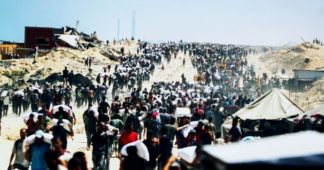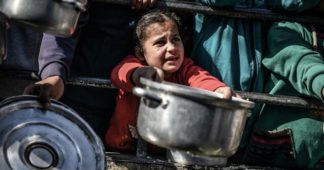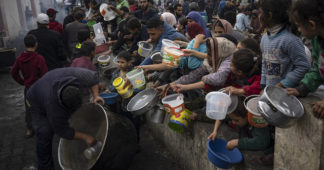Abdel Qader Sabbah and Sharif Abdel Kouddous
Aug 22, 2025
“Imagine looking at your child, and you can’t feed him. You can’t do anything for him.”
GAZA CITY—Umm Jana’s two-and-a-half year-old daughter, Jouri, died earlier this month from malnutrition. Now, her other daughter, five-year-old Jana, is also slowly starving to death and there is little Umm Jana can do to save her.
“My daughter Jouri—because of the famine—was deeply affected. She developed severe malnutrition and health complications that led to her death. I hope I never have to go through with Jana what I went through with Jouri,” Umm Jana told Drop Site News in an interview at the Patient’s Friends Benevolent Society Hospital in Gaza City. Jana was lying on a cot beside her, barely stirring.
“We’re living through extremely difficult days and a very harsh famine,” she said. “Jana is battling death. Her condition is extremely severe. She needs to be transferred abroad because there is no adequate treatment for what she’s experiencing.”
On Friday, the world’s leading authority on food crisis—the UN-backed Integrated Food Security Phase Classification (IPC)—officially declared a full-blown, Phase 5 “catastrophic” famine in the governorate of Gaza, which includes Gaza City, a classification characterized by “starvation, destitution, and death.”
Aaed Abu Khater’s 13-year-old son, Atef, died from malnutrition earlier this month in Gaza City. “Atef was like the rest of the people, suffering from a lack of food and water,” Abu Khater told Drop Site. “Imagine looking at your child, and you can’t feed him. You can’t do anything for him…The most precious thing I had, my son, died of hunger.”
Without proper nutrients, including vegetables and protein, Atef’s weight dropped dramatically and his condition continued to deteriorate until he was no longer able to walk or move. Abu Khater carried him to hospital where he spent 18 days on IV fluids before being discharged due to a lack of beds. “When we were finally able to feed him, the hunger had exhausted him so much he could barely eat. He could barely chew potatoes and he couldn’t eat bread,” Abu Khater said.
During the three days he was back at home, two of Atef’s cousins were shot and killed in an aid massacre at the Zikim crossing. “You’re going to die either way. If you go to Zikim, you’ll die. If you stay in your tent, you’ll die. You’ll die from hunger, or you’ll be shot. It’s a trap,” Abu Khater said.
Atef was clearly dying at home, so his father prepared to take him back to the hospital. In the morning, as his mother washed him and got him ready to go, he died sitting in a chair. “If I showed you his picture when he was in middle school, Atef was tall, and I’d say his weight was around 60 kilograms. By the time we buried Atef, he was barely over 25 kilos. When we buried him, we did it in a small grave, about 50 centimeters wide, placed next to those of his uncles. He was a skeleton—just bones covered in skin,” Abu Khater said.
According to the IPC, for a region to be technically classified as experiencing famine, at least 20% of people must be suffering extreme food shortages, with one in three children acutely malnourished, and two people out of every 10,000 dying daily from starvation or malnutrition and disease.
Conditions in the North Gaza governorate, which includes Beit Hanoun and Jabalia, are estimated to be just as severe or even worse. Deir al-Balah in central Gaza and Khan Younis in the south, which are currently classified as Phase 4—experiencing “emergency” hunger—are expected to officially be declared in a famine by September.
“As this famine is entirely man-made, it can be halted and reversed,” the IPC said. “The time for debate and hesitation has passed, starvation is present and is rapidly spreading. There should be no doubt in anyone’s mind that an immediate, at-scale response is needed. Any further delay—even by days—will result in a totally unacceptable escalation of Famine-related mortality.”
“If a ceasefire is not implemented to allow humanitarian aid to reach everyone in the Gaza Strip,” the IPC emphasized, “and if essential food supplies, and basic health, nutrition, and WASH services are not restored immediately, avoidable deaths will increase exponentially.”
United Nations officials said in no uncertain terms that the famine in Gaza is a result of Israeli policy, with the UN High Commissioner on Human Rights Volker Turk calling it “the direct result of actions taken by the Israeli government” and adding, “It is a war crime to use starvation as a method of warfare, and the resulting deaths may also amount to the war crime of willful killing.”
Tom Fletcher, the under secretary-general for humanitarian affairs and emergency relief coordinator said it was a “21st century famine, watched over by drones and the most advanced military technology in history…It is a famine on all of our watch. Everyone owns this, the Gaza famine is the world’s famine.”
Israel has imposed a harsh siege on Gaza for nearly two decades. Beginning in 2007, Israeli authorities mandated that Palestinians in the enclave should receive the minimum amount of food to avoid malnutrition, providing 37% fewer fruits and vegetables than the average Israeli has access to.
When Israel launched its genocidal assault in October 2023, it imposed a full-spectrum blockade, which eased and tightened over the course of the past 22 months. In March, Israel imposed the longest full-spectrum blockade of the war, with no aid entering Gaza for nearly three months. It dismantled the UN aid distribution system that was in place and, on May 27, it began allowing in a little amount of aid in a system overseen by the U.S., Europe and Israel-backed Gaza Humanitarian Foundation, with just four distribution sites located in heavily militarized zones. Since then, over 2,000 starving Palestinians have been killed as they try to get food in aid massacres.
The forced starvation campaign reached a tipping point this summer. At least 273 people in Gaza have died of famine and malnutrition since the start of war, including 112 children. A staggering 86 of those starvation deaths—or 68% of the total—have occurred in the past month, according to a tally of Health Ministry figures. Absent a ceasefire and a massive influx of aid and medical treatment, many more are projected to die of hunger and malnutrition in the coming period.
In June 2024, Israel bombed the tent camp where the Abu Khater family was taking shelter. Abu Khater was injured, one of his other sons was killed, and his youngest son was wounded with shrapnel in the eye. “One died from a bombing. Another died from hunger. Maybe another one will die from scabies, or disease, or the sewage, or from lack of hygiene. You go to sleep terrified, you don’t know where death is going to come from,” Abu Khater said. “There are hundreds, thousands going through the same thing. It’s repeating daily.”
Dr. Musab Farwana, a pediatrician in the Pediatric Department and Malnutrition Department at the Patient’s Friends Benevolent Society Hospital, told Drop Site that all medical facilities in Gaza have a dire lack of supplies.
“As a hospital, we lack baby formula, nutritional supplements, Cerelac, biscuits, and therapeutic food like peanut butter paste—all of which on its own is not enough. For children aged around one to one and a half years, we also need vegetables, meats, and proteins. Vegetables provide essential vitamins. This is something the entire population of Gaza, around 2.4 million people, is deprived of. We all lack these nutrients,” he said.
Inside the hospital, emaciated children and babies barely able to move lie in cots or sit with blank stares, drawn faces, and ribcages and spines poking out from their torsos.
Inside the Patient’s Friends Benevolent Society Hospital in Gaza City. August 7, 2025. (Video by Abdel Qader Sabbah)
continue reading and see pictures/ video at: dropsitenews.com
Drop Site News Middle East Research Fellow Jawa Ahmad contributed to this report.
We remind our readers that publication of articles on our site does not mean that we agree with what is written. Our policy is to publish anything which we consider of interest, so as to assist our readers in forming their opinions. Sometimes we even publish articles with which we totally disagree, since we believe it is important for our readers to be informed on as wide a spectrum of views as possible.











